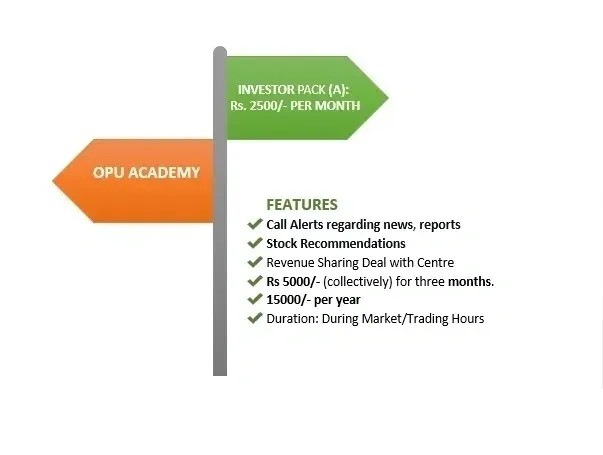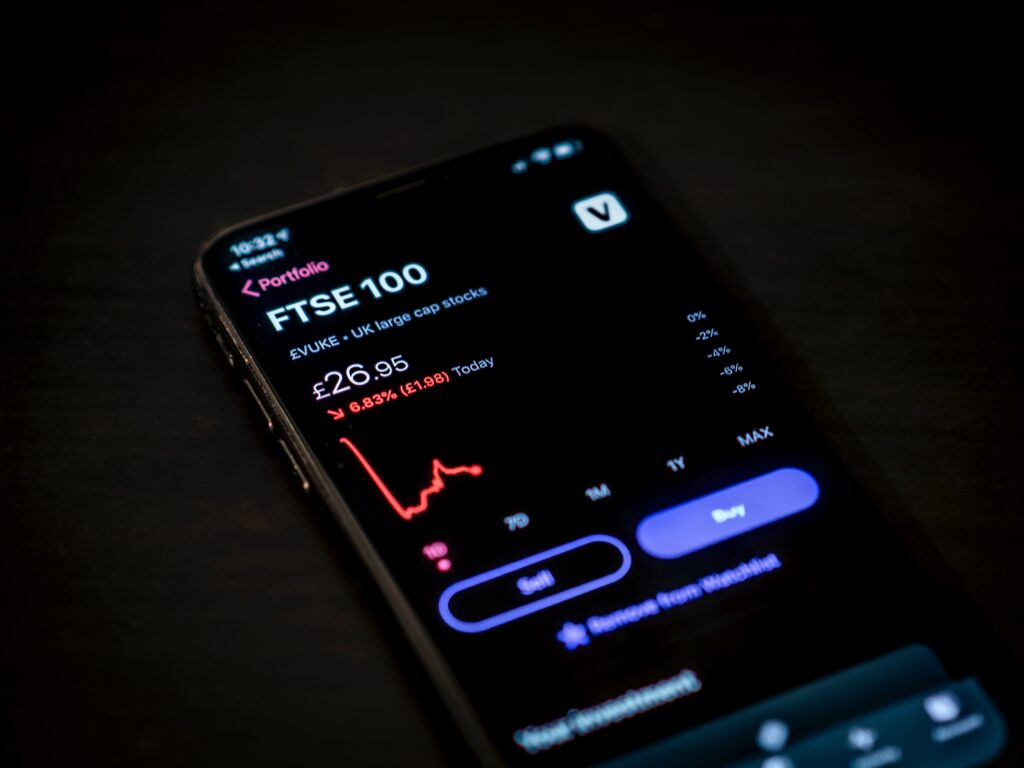Training
Training
Investment Training
A) INVESTOR WITH TRAINING PACK Rs.2500/-
- 6 hrs 30 mins
- ₹2,500(Pay later)

Per Month Rs.2500/- & It’s a Golden opportunity to Our Subscribers that we provide Investment Premium Services Pack (A) in just Rs.2500/- Only. Very useful for start as beginner in stock market.
Your Benefits: Stock Alerts regarding News, Reports, Stock Market-Related information, Training, & Buy /Sale Levels. Get eligibility for OPU Center if you’re our Premium Pack Subscriber.
Benefits : You will get 20% of Subscription Revenue Sharing Deal for every new Subscriber which you interduce with US
Condition: Eligibility will persist as long as you’re our Premium Subscriber. To subscribe, pls type msg “Hi opu ” and send it on WhatsApp Number +917710048506 or Book your appointment to get a call from our executive for confirmation of your services. Apply Now! (We always happy to serve Our Premium Subscribers)
Intraday Training
Nifty & Bank Nifty Future
NIFTY and BANK NIFTY are stock market indices in India. NIFTY is the NSE Nifty 50, which represents the performance of the top 50 companies listed on the National Stock Exchange (NSE) of India. BANK NIFTY, on the other hand, is a sectoral index that represents the performance of the banking sector in India. It includes major banking and financial stocks.
- Derivatives Contracts: NIFTY Future and BANK NIFTY Future are financial derivatives. They are agreements to buy or sell the underlying NIFTY or BANK NIFTY index at a specified price on a future date.

Leveraged Trading: Futures contracts allow traders to speculate on the future direction of the index without owning the actual underlying stocks. This provides leverage, which means a small amount of capital can control a larger position. However, leverage can amplify both gains and losses.
Settlement: Futures contracts can be cash-settled or physically settled. In the case of NIFTY and BANK NIFTY Futures, they are typically cash-settled, which means the contract is settled in cash based on the difference between the contract price and the actual index value on the settlement date.
Nifty & Bank Nifty Options
NIFTY and BANK NIFTY are two popular stock market indices in India. NIFTY represents the National Stock Exchange (NSE) and includes the top 50 companies listed on the NSE. BANK NIFTY, on the other hand, is a sectoral index that tracks the performance of the banking sector in India.
- Call and Put Options: NIFTY and BANK NIFTY options come in two main types: call options and put options. Call options give the holder the right, but not the obligation, to buy the underlying index at a specified strike price before or on the expiration date. Put options, on the other hand, give the holder the right to sell the underlying index at a specified strike price.

Strike Price: The strike price is the price at which the option holder can buy (in the case of a call option) or sell (in the case of a put option) the underlying index. Different strike prices are available for different expiration dates.
European Style: NIFTY and BANK NIFTY options are European-style options, which means they can only be exercised at the expiration date, not before.
Leverage: Options provide leverage, which means you can control a larger position with a relatively small amount of capital. This can amplify both potential gains and losses.

Stock Future
Stock futures are financial derivatives that represent a contract to buy or sell a specific amount of a particular stock at a predetermined price on a future date. These contracts are traded on futures exchanges and serve a variety of purposes for investors and traders.
Here are some key points to understand about stock futures:
Purpose: Stock futures are used for various purposes, including speculation, hedging, and arbitrage. They allow traders and investors to profit from the price movements of the underlying stocks without actually owning the stocks.
- Underlying Asset: Each stock futures contract is tied to a specific underlying stock. For example, there may be stock futures contracts for companies like Apple, Microsoft, or Google.
Expiration Date: Stock futures contracts have a specified expiration date, which is when the contract must be settled. At this point, the contract can be closed out or allowed to expire.
Contract Size: Each stock futures contract has a predetermined contract size, which represents the number of shares that the contract controls. This can vary depending on the exchange and the specific contract.

Stock Options
Stock options are a financial instrument that gives an individual the right, but not the obligation, to buy or sell a specific number of shares of a company’s stock at a predetermined price (the strike price) within a specified time frame. Stock options are often used as a form of compensation for employees, particularly in the technology and startup industries, but they are also traded by investors and speculators.
There are two main types of stock options:
Call Options: A call option gives the holder the right to buy a specific number of shares at the strike price before the option’s expiration date. Call options are typically used when an investor believes the stock’s price will rise.
- Put Options: A put option gives the holder the right to sell a specific number of shares at the strike price before the option’s expiration date. Put options are generally used when an investor believes the stock’s price will fall.
Currency Training
Currency & Training Pack Rs .5000/-
- 9 hrs 30 mins
- Rs.5000. Per Month

Per Month Rs.5000. & Its a Golden opportunity to Our Subscribers that we provide Premium Services for CURRECNY Training & Buy /Sale Levels in Just Rs.5000 /- only. Minimum 6 month to1 year Stock Market Trading Experience or Currency Trading Experience Needed. Get eligibility for OPU Center if you’re our Premium Pack Subscriber.
Benefits : You will get 20% of Subscription Revenue Sharing Deal for every new Subscriber which you interduce with US
Condition: Eligibility will persist as long as you’re our Premium Subscriber. To subscribe, pls type msg “Hi opu ” and send it on WhatsApp Number +917710048506 or Book your appointment to get a call from our executive for confirmation of your services. Apply Now! (We always happy to serve Our Premium Subscribers)
India Currency Market
The currency market in India refers to the foreign exchange (forex) market, where currencies are bought and sold. This market plays a crucial role in the global economy and is essential for businesses, investors, governments, and individuals engaged in international trade, finance, and investment. Here are some key aspects of the currency market in India:
Regulatory Authority: The Reserve Bank of India (RBI) is the central regulatory authority that oversees and regulates the currency market in India. It formulates policies, issues guidelines, and manages the foreign exchange reserves of the country.
Exchange Rate System: India follows a managed float exchange rate system. This means that the value of the Indian rupee (INR) is determined by supply and demand factors in the forex market but with some intervention and control by the RBI to maintain stability.
Forex currency market

The Forex (foreign exchange) market is the largest and most liquid financial market in the world where participants buy, sell, exchange, and speculate on the value of various currencies. It plays a crucial role in the global economy by facilitating international trade and investment. Here are some key aspects of the Forex market:
Market Participants: The Forex market is decentralized and comprises a wide range of participants, including banks, financial institutions, governments, corporations, hedge funds, retail traders, and individual investors. These participants trade in currency pairs, where one currency is exchanged for another.
Currency Pairs: Currencies are quoted in pairs, such as EUR/USD (Euro/US Dollar), GBP/JPY (British Pound/Japanese Yen), or USD/JPY (US Dollar/Japanese Yen). The first currency in the pair is called the base currency, and the second is the quote currency.
Exchange Rate: The exchange rate is the price of one currency relative to another. It reflects the value of one currency in terms of another. Exchange rates are constantly fluctuating due to supply and demand factors, economic events, geopolitical developments, and market sentiment.
Commodity Training
Per Month Rs.5000. & Its a Golden opportunity to Our Subscribers that we provide Premium Services for COMMODITY (special in Gold & Silver )Training & Buy /Sale Levels in Just Rs.5000 /- only. Minimum 6 month to1 year Stock Market Trading Experience or Commodity Trading Experience Needed. Get eligibility for OPU Center if you’re our Premium Pack Subscriber.
Benefits : You will get 20% of Subscription Revenue Sharing Deal for every new Subscriber which you interduce with US
Condition: Eligibility will persist as long as you’re our Premium Subscriber. To subscribe, pls type msg “Hi opu ” and send it on WhatsApp Number +917710048506 or Book your appointment to get a call from our executive for confirmation of your services. Apply Now! (We always happy to serve Our Premium Subscribers)


